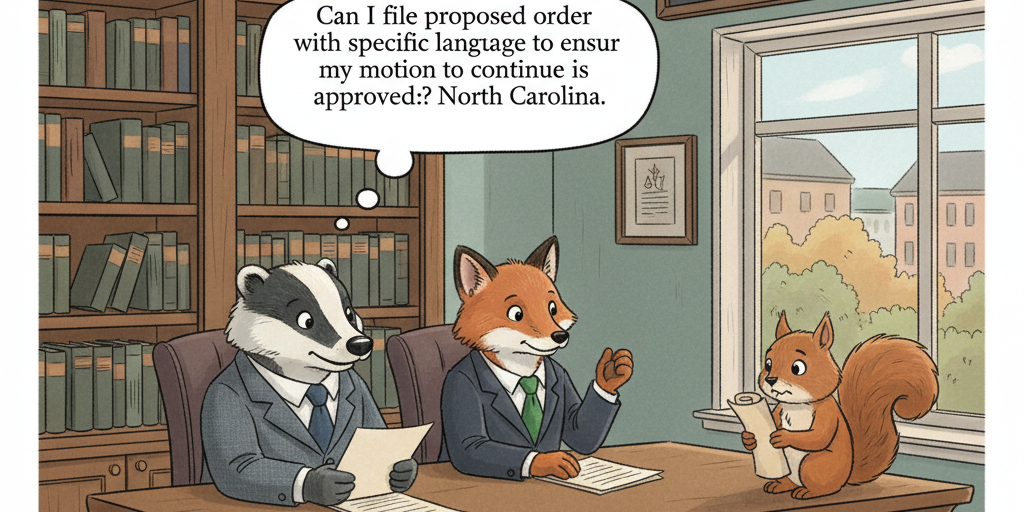Can I file a proposed order with specific language to ensure my motion to continue is approved? – North Carolina
Short Answer
In North Carolina estate and related special proceedings before the Clerk of Superior Court, a proposed order is not required to obtain a continuance. The clerk may continue a hearing for good cause and has broad discretion to manage the calendar. A clear, timely motion and proper notice to all parties matter more than specific wording. A proposed order with agreed language can help the clerk act quickly, but approval turns on the facts, not magic words.
Understanding the Problem
You want to know whether submitting your own proposed order—with specific language—will ensure the Clerk of Superior Court grants your last-minute motion to continue a scheduled hearing in an estate proceeding in North Carolina. The motion was filed shortly before the hearing, and you need confirmation it was granted.
Apply the Law
Under North Carolina law, the Clerk of Superior Court presides over estate and related special proceedings and has wide authority to control the proceedings and calendar. The clerk can enlarge time for required acts and can continue hearings for cause. Before a deadline expires, the standard is cause shown; after a deadline expires, the standard is excusable neglect. The clerk may act on motion and, in some circumstances, without notice, but good practice is to file and serve a motion with concrete reasons, request a specific new date (or allow the clerk to set one), and follow up with the clerk’s office. A proposed order is not mandated, but it can streamline entry—especially if all parties consent.
Key Requirements
- Show good cause: Identify specific, legitimate reasons for the continuance (e.g., unavoidable conflict, illness, late-produced evidence) and request a reasonable new setting.
- File promptly and serve all parties: Move as soon as the need arises and serve under Rule 5; late requests require stronger justification.
- Address timing standards: If you seek to extend a required act before its deadline, “cause shown” suffices; after it expires, you must show excusable neglect.
- Use a proposed order to help (not to guarantee): Include findings of good cause, the new date or that the clerk will reset, and a certificate of service.
- Confirm with the clerk: Until a signed order enters, plan to appear; calendaring practices vary by county.
What the Statutes Say
- North Carolina Gen. Stat. § 28A-2-6 (Estate proceedings procedures) – Sets procedures, applies selected civil rules, and allows enlarging time for cause or excusable neglect.
- North Carolina Gen. Stat. § 7A-103 (Powers of the clerk) – Gives the clerk broad authority to manage proceedings.
- North Carolina Gen. Stat. § 1-301.3 (Appeals from the clerk) – Requires written orders with findings and governs the record, underscoring the importance of a written continuance order.
- North Carolina R. Civ. P. 6 (Time) – Addresses time computation; selected subdivisions apply in estate proceedings via § 28A-2-6.
Analysis
Apply the Rule to the Facts: Because your motion was filed shortly before the hearing, the clerk will look for concrete good cause and prompt notice to all parties. A proposed order can help the clerk enter a quick ruling, especially if you note consent from the other side or attach documentation of the conflict. However, the clerk’s discretion—not specific wording—controls. If you do not receive a signed order before the docket call, you should appear, as the hearing remains on calendar unless continued by written order.
Process & Timing
- Who files: The requesting party. Where: Clerk of Superior Court in the county where the estate or special proceeding is pending. What: Motion to Continue (no statewide AOC form) and a short proposed Order on Continuance. When: File as soon as the need for a continuance is known; if it’s within a few days of the hearing, also call the clerk’s office to alert staff.
- Serve all parties under Rule 5 the same day the motion is filed; seek written consent if possible. The clerk may rule on the papers, request a brief conference, or set a short hearing. Timelines vary by county.
- Obtain a signed written order continuing the matter to a date certain or off calendar for reset. Confirm the new date with the clerk’s office and serve the order on all parties.
Exceptions & Pitfalls
- Assuming a continuance without a signed order; the clerk may still call and hear the case.
- Vague or unsupported reasons; provide specifics and, when available, documentation.
- Failure to serve all parties or to advise the clerk’s office; both can delay or derail relief.
- Proposing a date without checking the clerk’s calendar; suggest alternatives or defer to the clerk to reset.
- Confusing a hearing continuance with extending a filing/response deadline; after a deadline passes, the standard is excusable neglect.
Conclusion
Filing a proposed order will not guarantee approval of your continuance in a North Carolina estate or special proceeding, but it can help the clerk act quickly. The clerk may grant a continuance for cause and manages the calendar in their discretion. File and serve a prompt, specific motion showing good cause, include a proposed order, and confirm with the clerk. Next step: file your motion with the Clerk of Superior Court and serve all parties immediately; appear unless you receive a signed order.
Talk to a Probate Attorney
If you’re facing a fast-approaching estate hearing and need a continuance, our firm has experienced attorneys who can help you understand your options and timelines. Call us today at [919-341-7055].
Disclaimer: This article provides general information about North Carolina law based on the single question stated above. It is not legal advice for your specific situation and does not create an attorney-client relationship. Laws, procedures, and local practice can change and may vary by county. If you have a deadline, act promptly and speak with a licensed North Carolina attorney.


